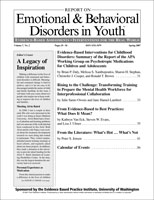Examining Parents’ Preferences for Children’s Mental Health Services Using Conjoint Analysis
Author: Frances Arnold Wymbs.
Source: Volume 11, Number 03, Summer 2011 , pp.74-78(5)

< previous article |next article > |return to table of contents
Abstract:
Up to 80% of children who need mental health services do not receive them (Kataoka et al., 2002), and of the 20% who do receive services, more than half drop out (Baekeland & Lundwall, 1975; Kazdin, 1996). The evidence base for children’s mental health treatments indicates the importance of parents’ involvement in treatment planning and implementation (Hoagwood, 2005; Hoagwood et al., 2010). However, parents seeking treatment for children’s mental health problems may not want what is offered to them (Vick & Scott, 1998). Poor alignment between parents’ preferences and the mental health treatment received might explain why fewer than half of families seeking treatment for children’s mental health problems complete a course of treatment (Baekeland & Lundwall, 1975; Kazdin, 1996; Miller & Prinz, 1990; Pekarik & Stephenson, 1988). A parent’s expectations about treatment is an important factor in ultimate engagement and have been found to affect parents’ attendance, participation, and retention in these services (e.g., Nock & Kazdin, 2001).Keywords: provider-recommended, preferred treatment, service delivery options, multi-attribute choices, psychosocial outcomes, Opt Out Programs
Affiliations:
1: Seattle Children’s Hospital.